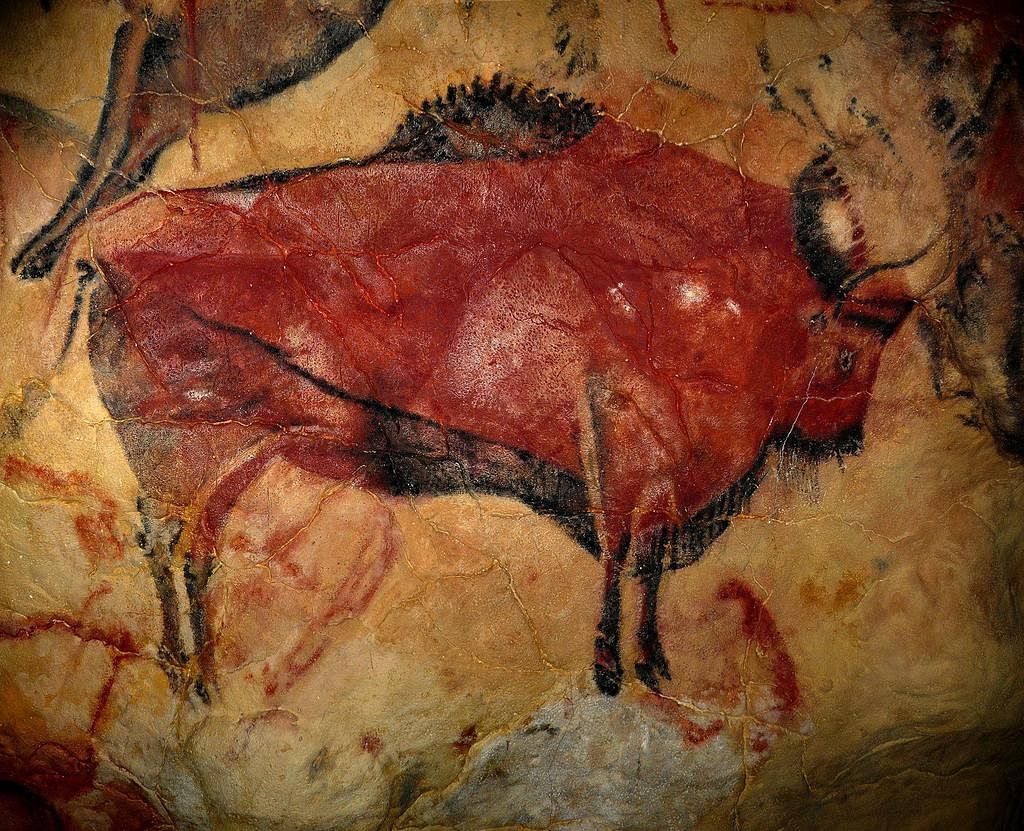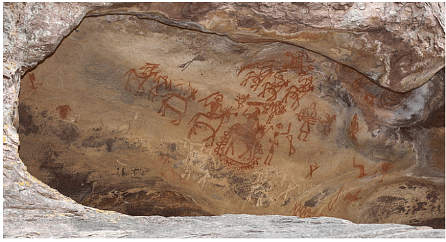≫ Prehistoric Periods in India – According to Tools
Ancient history can be divided into different periods according to the tools used by people then.
- Paleolithic Period: 2 million BC – 10,000 BC
- Mesolithic Period: 10,000 BC – 8000 BC
- Neolithic Period: 8000 BC – 4000 BC
- Chalcolithic Period: 4000 BC – 1500 BC
- Iron Age: 1500 BC – 200 BC
 Paleolithic Art
Paleolithic Art
≫ Prehistoric Period – Palaeolithic Period (Old Stone Age)
(i) This is further divided into three:
- Lower Palaeolithic Age: up to 100,000 BC
- Middle Palaeolithic Age: 100,000 BC – 40,000 BC
- Upper Palaeolithic Age: 40,000 BC – 10,000 BC
(ii) Lower Palaeolithic age
- Hunters and food gatherers; tools used were axes, choppers and cleavers.
- One of the earliest lower Palaeolithic sites is Bori in Maharashtra.
- Limestone was also used to make tools.
- Major sites of lower Palaeolithic age
(1) Soan valley (in present Pakistan)
(2) sites in the Thar Desert
(3) Kashmir
(4) Mewar plains
(5) Saurashtra
(6) Gujarat
(7) Central India
(8) Deccan Plateau
(9) Chotanagpur plateau
(10) North of the Cauvery River
(11) Belan valley in UP - There are habitation sites including caves and rock shelters.
- An important place is Bhimbetka in Madhya Pradesh.
(iii) Middle Palaeolithic age
- Tools used were blades, pointers, scrapers and borers.
- The tools were smaller, lighter and thinner
- Important middle Palaeolithic age sites
(i) Belan valley in UP
(ii) Luni valley (Rajasthan)
(iii) Son and Narmada rivers
(iv) Bhimbetka
(iv) Upper Palaeolithic age
- Emergence of Homo sapiens
- A lot of bone tools, including needles, harpoons, blades, fishing tools and burin tools.
- Major sites of Upper Palaeolithic age
(1) Belan
(2) Son
(3) Chota Nagpur plateau (Bihar)
(4) Maharashtra
(5) Orissa and
(6) The Eastern Ghats in Andhra Pradesh - Paintings at Bhimbetka site belong to this age.

≫ Prehistoric Period – Mesolithic Period (Middle Stone Age)
- Major climate change happened.
- Climate became warmer and more humid.
- Rainfall increased and so more availability of flora and fauna.
- Domestication of animals and plants were seen for the first time.
- Started 12000 years ago.
- First animal to be domesticated was the wild ancestor of the dog.
- Sheep and goats were the most common domesticated animals.
- Hunting and food gathering continued.
- First human colonization of the Ganga plains.
- Microliths have been excavated.
- They are small stone tools that were probably stuck to stones to be used as saws and sickles.
- Major sites:
(1) Brahmagiri (Mysore)
(2) Narmada
(3) Vindhya
(4) Gujarat
(5) UP
(6) Sojat (Rajasthan)
(7) Bhimbetka
(8) Godavari Basin
(9) Sarai Nahar Rai - Tools used were blades, crescents, triangles, trapezes, spearheads, knives, arrowheads, sickles, harpoons and daggers.[/su_box]
≫ Prehistoric Period – Neolithic Period (New Stone Age)
- Starting of agriculture
- Moving from nomadic to settled life
- Wheel discovered. Ragi, wheat and horse gram were cultivated
- They knew to make fire
- Knew pottery
- Also, shows first intentional disposal of the dead
- Important sites:
(1) Inamgaon
(2) Burzahom (Kashmir)
(3) Mehrgarh (Pakistan)
(4) Daojali Hading (Tripura/Assam)
(5) Hallur (AP)
(6) Paiyampalli (AP)
(7) Chirand (Bihar)
(8) Evidence of houses
≫ Prehistoric Period – Chalcolithic Period (Copper Age/Bronze Age)
Indus Valley Civilization (2700 BC – 1900 BC)
- Other settlements at
- Brahmagiri Navada Toli (Narmada region)
- Chirand (Ganga region) and
- Mahishadal (West Bengal)
≫ Prehistoric Period – Iron Age
- Arrival of the Aryans: Vedic Period
- Jainism, Buddhism
- Mahajanapadas: the first major civilisation on the banks of the river Ganga after the Indus Valley.
No comments:
Post a Comment